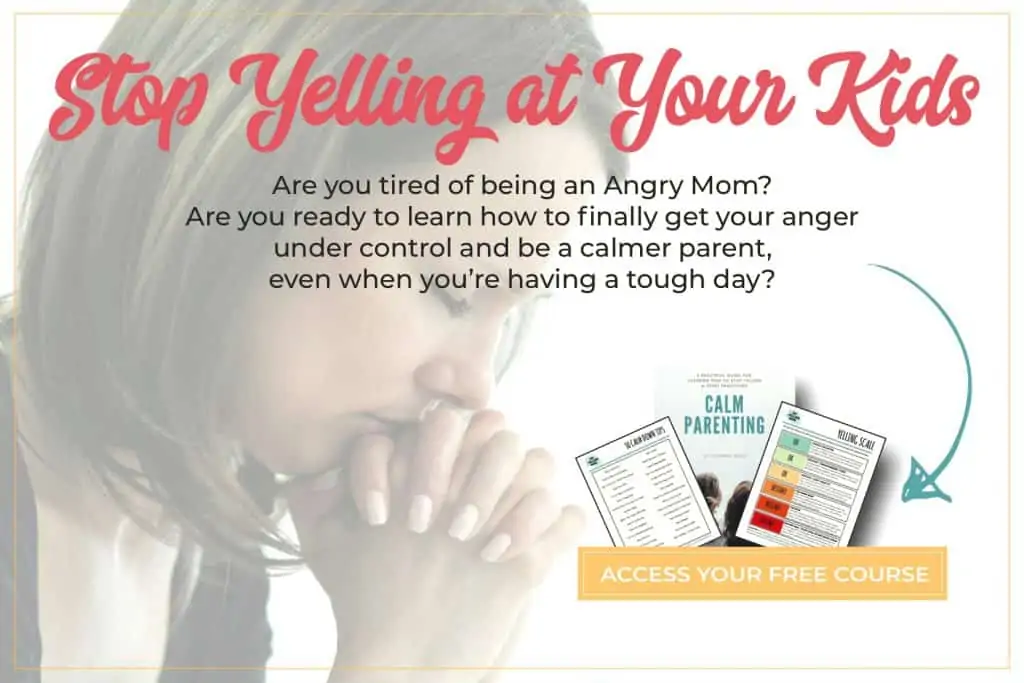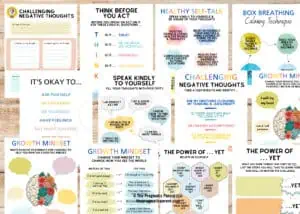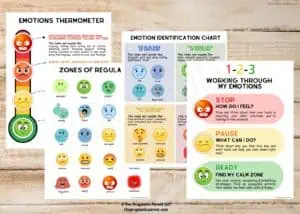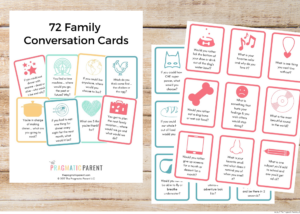How Can I Get My Kid’s Attention Without Yelling? How to get kids to listen and give you their attention, without raising your voice or yelling.
This is the first part of a 4-part series: Get Kids to Listen, Put a Stop to Power Struggles and Stay Calm. Plus, why using family conversation cards and daily picture routine cards can help with positive attention and positive power of children.

How Can I Get My Kid’s Attention Without Yelling?
Is there anything more infuriating than asking your child to do something or help around the house, and they don’t listen? When kids don’t listen, it can make any parent feel like a doormat, and quickly lead down the path to yelling.
Why won’t my kids listen?
Or worse, why won’t my kids listen unless I yell?
There’s no simple answer to this common parenting problem, and that’s because it’s complex and there are a lot of dynamics which factor into why a child isn’t listening.
This series will help explain how kids are hard-wired for positive attention and positive control, what happens when things are off balance, how a parent’s personality and parenting style factor into confrontations, and how to use positive boundaries and consequences without any blame, shame, or pain to help your child make choices for better results in the future.
Get Kids to Listen, Put a Stop to Power Struggles and Stay Calm.
There’s one thing you need to know about all kids… they’re hard-wired for attention and power.
I know the word “power” can carry negative connotations, and that’s not what I mean at all. The power I’m talking about it is all about having self-autonomy, the ability to make choices and having age-appropriate power over one’s environment.
Power is important even for toddlers, unless you like having bedtime battles and tantrums. I don’t know about you, but I definitely do not.
The attention all children are hard-wired for is of course, the positive kind. They are fueled by praise, encouragement, love, physical contact, connection and the positive interactions they have with friends, family, teachers, coaches, caregivers and those around them each day.
What happens when kids don’t have positive attention or power?
Kids begin to use negative behavior to get the attention they’re hard-wired for.
When children find their negative behavior works to get them the attention they crave because their positive attention bucket is dry and empty, they’ll use this form of behavior more and more.
Not exactly what you want, huh?
What negative attention am I talking about?
- Bedtime battles night after night (fighting sleep, asking for you to come in the room time and time again, delaying sleep, etc.)
- Tantrums and meltdowns
- Sibling rivalry
- Mealtime battles
- Potty training gone awry
- Homework and chore resistance
- Backtalk and power struggles
I learned the practice I’m going to tell you about in this series from Amy McCready, the founder of Positive Parenting Solutions, who she teaches this concept in her course and book, If I Have to Tell You One More Time…: The Revolutionary Program That Gets Your Kids to Listen without Nagging, Reminding, or Yelling. The book should be a staple for every parent trying to overcome this one frustrating parenting struggle and put it behind them.
Here’s what she says…
Think of your kids having two buckets – a positive attention bucket and a positive power bucket.
Positive attention is pretty self-explanatory and the positive power bucket is about kids having control, a sense of autonomy and feeling of power.
Now, think about the day-to-day of a child. They’re told when to get dressed, what to wear, when to go to the bathroom, get in the car, eat, chores to do, homework that has to be done, when go to sleep, and on and on, day-in and day-out.
When children don’t have much say in their daily life, including age-appropriate power, they act out with negative attention.
They try to win, dig in their heels, push your buttons and prove to you whose boss.
That’s usually the time where parents engage in a battle to win, count 1-2-3, put them in time-out, or worse, lose your temper and yell.

How do you get ahead of the negative behavior?
That’s the key isn’t it…. getting ahead of the need to resort to negative behavior.
Of course, even when things are going smoothly, you’ll still have moments where you want to pull out your hair, but how much better does it sound if that only happens once a week and not two or three times a day.
I’d take that situation any day, and now I do since I’ve made sure to fill those positive power and attention buckets daily!
Here are some ideas to help you fill their attention and power buckets with positive interactions, love, autonomy and a sense of power.
Positive Attention Bucket Fillers:
- This is all about giving your time and being present.
- Schedule one-on-one time each day with each child for 10-15 minutes. Try to do something at the same time each day that both you and your child will look forward to such as cooking dinner together, reading a book before bed, going on a morning walk or run together, baking, watching your favorite show together. Consistency is really important.
- Use family conversation cards to strike up a fun conversation around the breakfast or dinner table.
- Give them your undivided attention. Turn off those devices, turn off screens and look at your child when they speak. (this is a big one about why kid’s don’t listen and half the battle is avoided by being present.)
- Practice saying “yes” more than you say no. It’s so easy to blurt out “no” when your child asks for something, but before you respond, weigh the situation and ask yourself what does it hurt to say yes. Of course, boundaries and rules can’t be broken, but if a child is asking to go play outside, have a snack, or ask a neighbor to ride bikes… then saying yes may not be a big deal and will go a lot further in the long run when you fill their positive attention bucket.
- Focus on the amount of positive interactions you have. The rule of 5 in parenting states for every 1 negative interaction you have, you need to have 5 positive interactions to balance things out. Read the full article on this here.
- Praise the good behavior you want to see often, and ignore the stuff you don’t. It’s as simple as that. When you draw attention to negative behavior, it stokes the fire for kids to give you more of it. The same holds true – if you want to see good behavior, praise your child for their actions so they associate good feelings with doing well, making good choices, being kind, working hard, etc.
Positive Power Bucket Fillers:
- Let your kids pick out their own clothes (this is a big deal for little ones!)
- Use picture routine cards (perfect for toddler – elementary age kids,) to help them move throughout their days without nagging or reminding from Mom or Dad. They’ll feel independent and empowered to go through the steps on their own.
- Give choices (offer no more than two choices for lunch, an activity, a movie to watch, where to go to eat out for dinner, etc. and honor your child’s choice.)
- Help your child earn rewards with positive behavior by using reward/allowance charts. Their choices and following through on responsibilities will earn them something such as a special dessert, a few dollars, or more if they’re older and you have this in your budget.
- Let kids have control and risk making mistakes. I know this is a haaaarrrrd one because we all hate to see our kids sad, get upset, feel defeated or lose confidence if things don’t go as planned, but mistakes are character-defining moments and make such a big impact in the long run. Having a growth mindset is very important for resiliency in children.
Here’s an example I can think of off the top of my head: When my son has money, it burns a hole in his pocket until he spends it. Part of giving him age-appropriate power is stepping back and letting him spend his money on the toys or things I may think are overpriced, or know will break in a week, because that’s what he’s decided to do. I have to keep my mouth shut and let him learn this on his own. It took a few times of realizing his pockets were empty, his toys didn’t last and instant gratification is just that… it lasts an instant, and it’s not long-lasting before he started saving his money.
- Mealtime battles are hard because as parents, you’re worried your child isn’t getting the nutrition they need and they’ll be asking for a snack in 20 minutes. Instead of cleaning their plate, what is a compromise both of you can agree to? That may be two bites of everything on their plate and call it good, or it could be saving their plate to heat up when they are hungry.
I hope this helps get some ideas flowing for your and your family.
Take Action: Getting Kids to Listen Without Yelling Takes Practice
For the next few days, focus on accumulating positive interactions and finding areas to give your child age-appropriate power.
Next: Read Part 2 of this series: Getting Kids to Listen without Yelling, Power Struggles and How to Stay Calm






